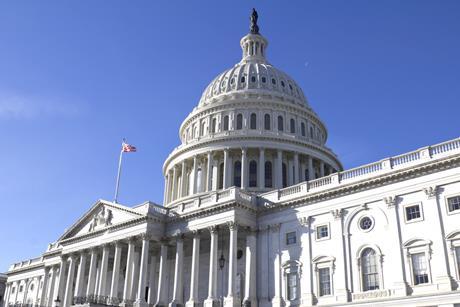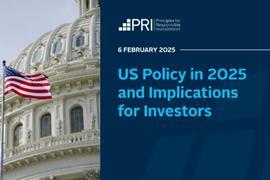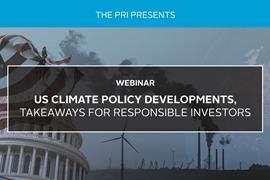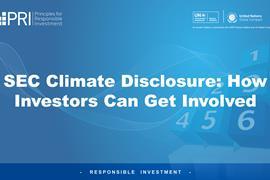US policy
The United States is home to the world’s largest capital market, with far-reaching influence on global financial systems. As the political landscape evolves, the PRI remains committed to supporting the work of signatories and advancing a sustainable financial system by actively engaging with Congress, regulators, industry associations, and stakeholders.
For nearly two decades, the PRI has worked around the world with business leaders and governments across the political spectrum to best support our signatories. We will continue to engage with administrative and elected officials, regardless of party affiliation, who work on issues relevant to our signatories and the broader work of the PRI.
Key publications
Policy briefing: Enabling US state-level sustainable financial systems
[Region: US] Five high-level policy recommendations that US state and local officials can consider to support responsible investment practices.
Policy briefing: Signatory responses to state anti-ESG laws
This briefing summarises interviews with US signatories regarding the impact of state anti-ESG laws on their business operations.
Policy briefing, 118th Congress: Analysis of proposed legislation in the financial services sector
[Region: US] This briefing presents summary and analysis of select proposed bills pending before the US House of Representatives and US Senate.
Congressional statement for the record
[Region: US] The PRI submitted a statement for the record regarding a hearing held by the House Financial Services Committee titled, “Protecting Investor Interests: Examining Environmental and Social Policy in Financial Regulation”.
Latest policy engagements
PRI response to the California Air Resources Board's information solicitation on implementation of climate disclosure legislation
The PRI submitted a consultation response to the California Air Resources Board's information solicitation to inform implementation of California climate disclosure legislation SB 253 and SB 261, as amended by SB 219. These laws impose climate-related disclosure requirements on US public and private companies that do business in California and meet certain annual revenue thresholds. Reporting pursuant to these requirements will help to provide investors with the comparable, decision-useful climate-related data they need (and currently lack) from companies to inform their investment decision-making processes, enabling them to allocate capital more efficiently, and account for climate-related financial risks and opportunities.
PRI letter to New York Governor supporting adoption of a human capital management disclosure bill
PRI submitted a letter to Governor Kathy Hochul of New York, supporting the adoption of Assembly Bill A5981. If signed, the bill would require companies operating in the state of New York to file their EEO-1 reports with the NY Secretary of State. Companies' data on the race, gender, and ethnicity of employees would then be made publicly available. By requiring companies to file their EEO-1 data for public release, New York can support investor efforts to identify and address HCM-related issues across their portfolios. Certain companies are already required to report this information annually to the Equal Employment Opportunity Commission, and as such, sharing this information with the State of New York—and with investors—requires no additional effort.
PRI Response to the Financial Accounting Standards Board (FASB) proposed accounting standards update for income taxes
The PRI supports the proposed changes to Topic 740 of the FASB Accounting Standards Codification® on requiring more granular and specific information regarding rate reconciliation and income taxes paid. We further recommend the FASB considers additional amendments in the future to meet the evolving needs of investors around income tax disclosures. The benefits to investors would be greatly enhanced if these proposed changes were to be accompanied by disclosures on key jurisdiction-level information such as revenues and operating results on a similar level of disaggregation.
PRI letter to Congress on consideration of the Department of Labor's "Prudence and Loyalty" rulemaking
PRI submitted a letter to Congress sharing concerns with a resolution to disapprove of the Department of Labor's "Prudence and Loyalty" rulemaking that provided clarity around investor consideration of ESG factors.
In the press
ESG Investigator | US states strike back on climate disclosure
ESG Dive | Anti-ESG laws challenge fiduciary obligations, add significant reporting burden: PRI
bloomberglaw.com | State Anti-ESG Laws Haven’t Deterred Some Investors, Report Says
Investments and Pensions | SEC approves long-awaited climate disclosure rule
Responsible Investor | US investors: SEC climate rule ‘step in right direction’ but more work needed
Washington Post | New rules will force U.S. firms to divulge role in warming the planet
Morningstar | 9 Things to Know About the SEC’s New Climate Rule and How It Affects You
BisNow | SEC Unveils New Emission Standards, Much to the Relief of CRE
The Hill | ESG shows free markets are working
ESG Investor | ESG Backlash “Understandable, but Misguided”
The Hill | Consistent, comparable disclosure sits at the heart of our global financial system
GreenBiz | Can we rewrite the rules of green finance quickly enough?
Blogs
- Previous
- Next
Webinars
US policy in 2025 and implications for investors
With the federal government shifting from Democratic to Republican Party control, this webinar focuses on the changes in priorities, leadership positions, and implications for US and global investors.
- Previous
- Next


























